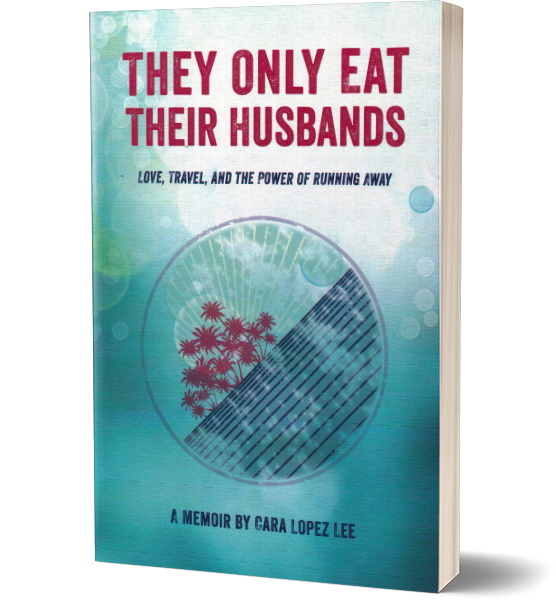I’m now in Taishan, China, doing research for a novel loosely based on the history of my Chinese-Mexican grandmother. I’ll tell you all about my experiences here when I return to America. For now, return with me to Thailand, as I continue the story of my three-day trek among the hill tribes…
DAY TWO – LAHU
In the morning, Tuk shows us around the village and tells us a bit about the local way of life. The Lisu people farm a series of fields, sown with different crops of fruits and vegetables. Tuk tells us they used to farm opium in this region, “but not so much anymore.” If any of the Lisu people are still growing poppies, who could blame them? Clearly they’re living hand-to-mouth.
Tuk shows us inside one of the larger huts. The hearth fire is burning, and the room is dim and smoky. He pulls a couple of crude-looking musical instruments from the wall, including a stringed instrument something like a guitar and a wind instrument made with a beer can. He explains that, on special occasions, the villagers gather to play music, sing and dance. He then passes the instruments around. When Pete gets hold of the one with the strings he begins plucking out the guitar lick from Deep Purple’s Smoke On the Water.
Tuk also tells us about some of the village’s other traditions. “The girls get married when they are 15 or 16 year old. If still unmarried by 21, they are consider too old, what you call ‘old maid.’”
“Hey, you guys, I’m an old maid!” Carly says.
“What does that make me?” I protest.
“Pretty damn old,” Pete says.
We walk on to a small peach orchard, where one of the village matriarchs is harvesting peaches that look less than ripe. She wears a black hat much like a turban, and has black teeth to match. Tuk introduces her, but we can’t pronounce her name, so Pete and Collin nickname her “Black Teeth.” Her teeth have turned that color from chewing beetle nuts, a common practice among hill tribes. Apparently, in their culture it’s considered attractive. She gives us a big black smile, and we smile back weakly.
As we walk on to the next village, Pete whispers, “Somebody needs to get these women some magazines, so they can learn a more shallow, impossible standard of beauty.”
Such are the cruel weapons of Western civilization. Such is the threat we pose to the hill tribes.
***
In the afternoon, we march across rice paddies to a collection of huts gathered around a stream, the Lahu village where we’re spending tonight. After five hours in the tropical heat, I arrive sweaty, grimy and disheveled. I’m eager to take advantage of the village’s gravity shower. A long hose carries water from an uphill stream, down to the stream that runs through the village. The hose can be propped on a pole at two different heights: one for showering, one for washing clothes. I do both.
The shower is in the middle of the village, in plain view of everyone. Although I’ve loosened my approach to modesty on the road, I’m not about to shock the Lahu tribe with an impolite show of nudity, so I shower in my sarong, like the local women. It doesn’t occur to me how challenging this might be. Apart from the difficulty of soaping one’s chest – I skip that part – the sarong grows heavy once it’s wet, and starts to fall. I nearly give everyone a show, as I struggle to pull up the sopping material and secure it above breasts too small to hold it up. I keep my panties on for this little fiasco – somehow I doubt the local women do the same – and I’m at a loss for how to remedy the resulting wet-panty situation.
When I return, dripping, to the one-room hut where we’re staying, villagers are constantly wandering in and out. With no chance of privacy, I try to wriggle out of my wet undies under cover of the sarong. But every time I let go of the sarong so I can pull off the panties, the sarong starts to slide off again. In desperation, I finally pull my long underwear on over the wet unmentionables. The hills grow chilly at night, and soon I’m shivering. I join Tuk in the cooking hut and thrust my wet rear in the direction of the hearth-fire.
A few locals join us for dinner. They eat quickly and silently, and eat notably small portions. When we see that their plates are empty, we offer them more food, concerned that they’ve given us the lion’s share. When they decline, we insisted we’ve had plenty – a polite fib. They take a few more bites. Then, taking us at our word, one young man takes the rest of the food, a generous heap, and dumps it near the door. When several cats run to lap up Tuk’s delicious meal, our eyes fly wide. Pete’s jaw hangs open.
As the locals melt back into their private lives and we climb into our sleeping bags, Pete confesses, “I’m kind of bitter about them giving the food to the cats. I would’ve eaten it if I’d known they didn’t want it – not that I didn’t get enough, but I could’ve eaten some more.”
We commiserate with him. We’re happy to share food with hungry people, but after five hours of hiking in the heat our sympathies don’t extend to felines. By the time we’re done with tomorrow’s long, hot hike, I doubt our sympathies will extend to anyone.
To be continued…




